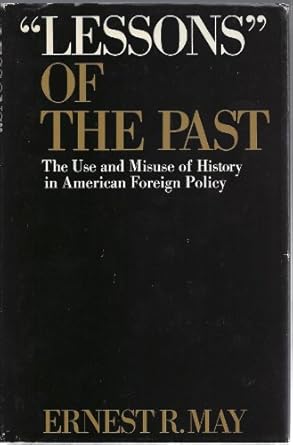This is the third in a series of posts on "Lessons" of the Past: The Use and Misuse of History in American Foreign Policy by Ernest R. May; it deals with Chapters V and VI. (See my posts on Chapters I & II, and Chapters III and IV.)
Bombing as an Example of Historical Analysis
Chapter V provides a summary historical analysis of the history of successful and unsuccessful bombing campaigns, where I am using the term success to indicate campaigns that resulted in a change of the target government's policies in directions intended by the governments conducting the bombing campaigns. Essentially, May seems to suggest that campaigns are successful in this way when they trigger changes in government, which in turn lead to new policies.
Nearly 40 years after "Lessons" of the Past was published I am struck by the apparent success of the bombing campaigns in the wars against Iraq in 1991 and 2003, and the current use of drones against people believed to lead terrorist organizations or cells.
In the case of Iraq, the air attack appeared successful in defeating air defenses and providing air superiority for U.S. forces in the ground fighting. The success was perhaps more tactical and less strategic than those discussed by May.
In the case of Al Qaeda, the drones are used for intelligence and to target individuals, in part justified by protection of U.S. lives. Perhaps the analysis provided by May is less relevant in the very asymmetric conditions of anti-terrorist campaigns.
Ultimately, however, I wonder whether the kind of historical analysis May is proposing can adequately consider the changes in military technology that occur between wars.
Predicting Future Foreign Policy Concerns
May provides a tutorial on the domestic sources of foreign policy priorities:
- The public, and the elites who form public opinion;
- The Congress, and the constituencies who most influence the legislators opinions;
- The domestic bureaucracies of the agencies traditionally involved in foreign affairs (State, Defense, Treasury, CIA, USAID, etc.)
- The Overseas missions of these agencies
- The White House bureaucracy -- National Security Council, Council of Economic Advisors, etc.
- The President's cabinet and key advisors, and of course
- The President himself.
May might have added the Media. Today, with the importance of cable news, social networking, and the Internet in molding opinion, the changes in media infrastructure are clearly changing the way public opinion is molded. However, May might have noted the impact of television on public opinion during the Vietnam war, or of Movie news and films on public opinion during and after World War II.
As May suggests, historians are better at looking at the past than anticipating the future. Still, foreign policy responds to things external to the United States. The breakup of the Soviet Union and Warsaw Pact, and the triumph of markets over central planning combined with the rise of militant Islam and the events of 9/11 led to a shift from Cold War oriented foreign policy to "the War on Terror" and wars in Iraq and Afghanistan.
Arab Spring and its aftermath bring to mind the wave of demonstrations in Europe in 1848, and surely have had their impact on U.S. foreign policy.
The world economic picture has changed, and with it the power of the United States. (See this post.) I suspect that Europe and China will become still more influential as competitors and cooperators in the future, as Japan and Germany did in the decades after World War II.
So too the real world is increasingly intruding. Fortunately, the Green Revolution has been successful in dealing with what was thought to be a Malthusian hunger crisis. So too, a revolution in nutrition and public health, together with a revolution in family planning have led to a radical change in global population dynamics. If less visible aspects of foreign policy had been less successful, we might have had to deal with apocalyptic situations in Asia and Africa as major foreign policy concerns.
Looking to the future, energy, climate change, loss of biodiversity, desertification, deforestation, deterioration of coastal zones, and other real world issues may come to be more important issues before the State Department and the White House.
Moreover, we may see "domestic" health, agriculture, energy, and environmental agencies come to play a more visible role in foreign policy.

No comments:
Post a Comment